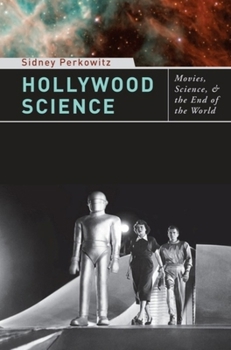Hollywood Science: Movies, Science, and the End of the World
Select Format
Select Condition 
Book Overview
Whether depicting humans battling aliens or a brave geologist saving lives as a volcano erupts, science-fiction films are an exciting visual and sensuous introduction to the workings of science and... This description may be from another edition of this product.
Format:Hardcover
Language:English
ISBN:0231142803
ISBN13:9780231142809
Release Date:December 2007
Publisher:Columbia University Press
Length:272 Pages
Weight:1.15 lbs.
Dimensions:0.8" x 6.4" x 9.1"
Customer Reviews
2 ratings
Instructive Fictional Science in the Movies
Published by Thriftbooks.com User , 16 years ago
"Hollywood Science" would seem to be a contradiction in terms. The Blob? Mothra? The Giant Mantis? Science fiction movies are a Hollywood staple, and they are also are disproportionately represented among the worst movies ever made. So how can Sidney Perkowitz, who is a research physicist and a professor of physics, take them seriously? Well, he doesn't take all of them seriously, but many he does, and even the ones that are turkeys have something to teach us. In _Hollywood Science: Movies, Science, & the End of the World_ (Columbia University Press), Perkowitz convincingly describes what is good and what is bad about science in the movies, and how sometimes even the bad is good. Movies are, after all, not reality, but the good ones have something to tell us about reality; and the ones that depict scientists or scientific efforts or disasters can prompt useful discussion, even in academic settings. Perkowitz goes through sci-fi movies starting with the grandfather of them all, Méliès's _Le Voyage Dans la Lune_ (in which moon voyagers within a gigantic projectile are shot by cannon to the Moon). One of the movies he finds scientifically sound is _Twister_ (1996) which shows tornado-chasers trying to get research tracking gadgets sucked up into a huge tornado, so they can get more information on how tornadoes form. Another weather-themed movie is _The Day After Tomorrow_ (2004) which showed the things that might happen due to global warming. As Perkowitz points out, the rapid disasters in the film are pretty bad science, but still pretty good: the movie was very popular, and people who saw it came out with demonstrably higher concerns about climate change. Genes are a good topic for the movies. It doesn't take much scientific fudging for the events in _Jurassic Park_ to happen, for instance. It is a problem that getting dinosaur DNA from blood within a mosquito within amber seems as if it is just not going to be possible (given the DNA's degradation after so many millions of years). A teensy scientific suspension of belief in that detail yields a movie that is a primer into the science of cloning in understandable terms, and is also an introduction into paleontological research about how dinosaurs lived. Perkowitz's scorn is saved for a documentary on the wish fulfillment properties of quantum physics in the "documentary" _What the Bleep Do We Know?_ (2004), and the "make-up-any-science" _The Core_ (2003), in which the scientists portrayed in the movie just make things up as they go along, drilling into thousands of miles of rock and magma and setting off hydrogen bombs within the Earth to get the iron core spinning again. "Find me a scientist!" yells the head of emergency management in _Volcano_ (1997). A scientist, any scientist, seems to be the order. There are plenty of scientists depicted in these movies, and Perkowitz details how evil or heroic scientists are portrayed in different ones. Characters introduced as "Doct
A Good General Overview of Science in Movies
Published by Thriftbooks.com User , 16 years ago
This is the third book that I've read recently on science as depicted in Hollywood movies; the other two being: "Insultingly Stupid Movie Physics" by Tom Rogers and "Don't Try This At Home" by Adam Weiner. Whereas these last two focus on specific movie scenes and analyze their plausibility (or impossibility) using mathematics and the application of sound scientific principles, this book is more general in its approach. First of all, movies are divided into two broad categories: those involving natural disasters and those involving disasters caused by humans. Then, movie story lines are recounted to varying degrees of detail; some movies are described in about a paragraph, while others are described over a few pages. After the descriptions, the science content is discussed in terms of whether it was well presented, possible, exaggerated, or complete nonsense. The social climate at the times when the movies were made is also discussed in an effort to understand the psychology of choosing the scientific subject matter that was presented. Finally, movie depictions of scientists are discussed and compared to scientists in the real world. The only shortcoming that this book may have is that some of the story lines that are presented are much too long and detailed for the purposes of this book; a person who has seen a given movie, possibly more than once, may be displeased at encountering a rather lengthy description of it. Otherwise, the book is quite engaging. The writing style is clear, friendly and accessible. This book can be enjoyed by anyone - math phobic or not; however, I suspect that it would likely appeal the most to science fiction movie buffs.





